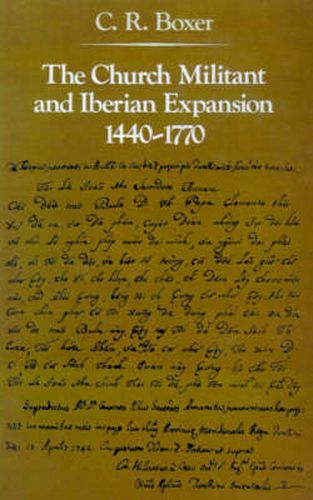Readings Newsletter
Become a Readings Member to make your shopping experience even easier.
Sign in or sign up for free!
You’re not far away from qualifying for FREE standard shipping within Australia
You’ve qualified for FREE standard shipping within Australia
The cart is loading…






The distinguished historian C. R. Boxer devoted years of research and reflection on European expansion overseas into the Americas and Asia. In The Church Militant and Iberian Expansion, 1440-1770, his analytical survey of the role of the Portuguese and Spanish missionaries of the Roman Catholic Church in the overseas expansion of the Iberian powers, he finds that the lasting results vary enormously. They range,
he writes, from enduring mass conversions in some regions, of which sixteenth century New Spain is the prime example, to the total failure in other countries, such as Cambodia, where the number of indigenous converts could be counted on two hands. Considering the church as a human as well as a divine institution,
the author focuses on four types of organizational problems: relations between the regular and the secular clergy; the mission as a frontier institution in many climes and many cultures; the close and inseparable connection between Cross and Crown; and the role of the Inquisition overseas. Boxer finds that the mere survival of these Christian minorities through the vicissitudes of over three centuries is a tribute to the work of the dedicated missionaries of the Church Militant in times past.
$9.00 standard shipping within Australia
FREE standard shipping within Australia for orders over $100.00
Express & International shipping calculated at checkout
The distinguished historian C. R. Boxer devoted years of research and reflection on European expansion overseas into the Americas and Asia. In The Church Militant and Iberian Expansion, 1440-1770, his analytical survey of the role of the Portuguese and Spanish missionaries of the Roman Catholic Church in the overseas expansion of the Iberian powers, he finds that the lasting results vary enormously. They range,
he writes, from enduring mass conversions in some regions, of which sixteenth century New Spain is the prime example, to the total failure in other countries, such as Cambodia, where the number of indigenous converts could be counted on two hands. Considering the church as a human as well as a divine institution,
the author focuses on four types of organizational problems: relations between the regular and the secular clergy; the mission as a frontier institution in many climes and many cultures; the close and inseparable connection between Cross and Crown; and the role of the Inquisition overseas. Boxer finds that the mere survival of these Christian minorities through the vicissitudes of over three centuries is a tribute to the work of the dedicated missionaries of the Church Militant in times past.